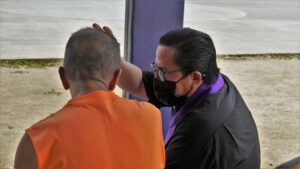The pontifical foundation Aid to the Church in Need (ACN) supports a prison pastoral program for priests and lay missionaries volunteers from the archdiocese of Guayaquil, in Ecuador, who care for and accompany both prisoners and their families, offering hope in the face of the climate of insecurity that has devastated the country in recent months.
Among the distant voices and screams of the inmates, Aleida Mejía, a lay missionary, remains firm and calm in front of the camera. Her voice does not waver as she shares with ACN the reasons that have led her to consecrate her life to the mission of evangelizing in prisons in the archdiocese of Guayaquil, one of the areas most affected by the latest wave of violence. “The Lord has taken me to places where His Word rarely reaches. And this is due to the shortage of missionaries,” she says.

Since 2023, the situation in the country has become almost unsustainable. Intentional homicides increased by 69.31% in the last year. In April 2024, President Daniel Noboa decreed a second state of emergency to combat the insecurity that kept Ecuadorians in suspense. With the army patrolling the streets and intervening in prisons – making the work of missionaries difficult – the country left images similar to those of a civil war. The social crisis began in the main state prisons – including the regional prison of Guayaquil – and broke out last January when the inmates rioted and there were explosions, kidnappings, shootings, looting and fires, causing a first state of emergency. Only in April was control of the prison regained.
“Mercy is for the most inveterate sinner”
In the midst of this whole situation that Ecuador is going through, prison ministry is more necessary than ever. Given the large number of prisoners – more than 12,000 in just five prisons – the number of people working in prison ministry is very small, which is why ACN is supporting a program to train more lay missionaries for prisons, like Aleida. This program also includes the conditioning of eight chapels to guarantee the safety of all.
“This mission has very complex barriers,” explains the missionary. Since we entered these prisons, we faced many challenges. The mere fact of access: encountering the social differences between those who are inside and those who are outside, the attitude of the police, for whom we are only an annoying procedure, or the prison guard, who, like society, thinks that “What we do does not make sense nor is it worth it,” says Aleida. “But it is worth it,” she says.
“There is also our own fear,” she continues explaining to ACN, “the fear of our families to let us come here, where the most despised in society are, where everyone is stigmatized as the most disposable and filthy. But this is precisely where Jesus wants us to be, because He calls us to love all his children, since we are all sinners,” says Aleida, remembering that anyone could find themselves in a similar situation.
Criminal groups primarily recruit young people between the ages of 15 and 27 to commit violent acts, often while these young people are in prison. If these young people do not see the possibility of leading a righteous life in freedom, they easily fall into the temptation of continuing their criminal ‘career’.
María Cristina Santacruz, archdiocesan coordinator of prison ministry in the diocese of Guayaquil, in statements to ACN affirms that “here the challenge is to love the least loved, the insignificant, the despised.” The coordinator also regrets the fact that “no one believes in prison ministry. People consider that it is not a world that needs to be attended to. But to me, the word of God tells me that mercy is for the most inveterate sinner. I do have hope and I believe that this project is something that the Divine Will wants.” Together with these two missionaries, more than 100 people, including bishops, priests, religious and lay missionaries, are dedicated “to this mission, giving their lives for their brother,” says María Cristina.
“We have seen strong conversion processes, we have seen Christ freeing those souls.”
The work with prisoners includes talks and masses, as well as workshops and courses on Christian values and faith. The mission is already showing some fruits, as Aleida says: “We have brought Jesus to these people, many people have come closer to the sacraments. We have seen strong conversion processes, we have seen Christ freeing those souls.”
The program also offers support to prisoners’ families and training courses so that, when prisoners are released, they can earn an honest living. “Many of these souls are already out of prison, they are parents, and they are doing things for society,” says Aleida. On the other hand, she highlights the importance of “praying for this mission so that these missionaries who liberate souls can continue to be trained, souls that have been captive, as mine was. We carry the word of God, saying that there is a God who loves us and who sets us free.”
For her part, María Cristina is deeply grateful. First, with God for having “called her to this mission” and “for showing me that it is worth it” and secondly to ACN and all those who so generously collaborate and “believe in this mission, as I do.” “Here I am, Lord, to do Your Will, to free the captives as He freed me,” she says smiling.
ACN supports this spiritual formation project of the archdiocese of Guayaquil. The program seeks to provide emotional support and spiritual formation to adults deprived of liberty, promoting internal reconciliation and social reintegration, so necessary in a country that is recovering from a panorama of serious internal conflict.










